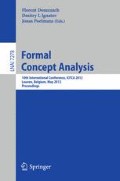Abstract
Reducing the size of concept lattices is a well-known problem in Formal Concept Analysis. A particular instance of this problem is the size reduction of concept lattices using factorization by complete tolerances. We show that all complete tolerances on a complete lattice (i.e., all possible ways of factorizing the lattice) with a naturally-defined operation of multiplication form a residuated lattice. This allows looking at the set of all complete tolerances as a scale of truth degrees using which we can evaluate formulas of predicate logic specifying the desired parameters of the factorization. We present illustrative example to clarify our approach.
Access this chapter
Tax calculation will be finalised at checkout
Purchases are for personal use only
Preview
Unable to display preview. Download preview PDF.
References
Belohlavek, R.: Fuzzy Relational Systems: Foundations and Principles. Kluwer Academic Publishers, Norwell (2002)
Czédli, G.: Factor lattices by tolerances. Acta Sci. Math. 44, 35–42 (1982)
Ganter, B., Wille, R.: Formal Concept Analysis – Mathematical Foundations. Springer (1999)
Hájek, P.: Metamathematics of Fuzzy Logic (Trends in Logic). Springer (November 2001)
Konecny, J., Krupka, M.: Block relations in fuzzy setting. In: Napoli, A., Vychodil, V. (eds.) CLA 2011: Proceedings of the 8th International Conference on Concept Lattices and Their Applications, pp. 115–130 (2011)
Krupka, M.: On Factorization of Concept Lattices by Incompatible Tolerances. In: Valtchev, P., Jaschke, R. (eds.) ICFCA 2011. LNCS, vol. 6628, pp. 167–182. Springer, Heidelberg (2011)
Ward, M., Dilworth, R.P.: Residuated lattices. Transactions of the American Mathematical Society 45, 335–354 (1939)
Wille, R.: Restructuring lattice theory: an approach based on hierarchies of concepts. In: Rival, I. (ed.) Ordered Sets, Boston, pp. 445–470 (1982); seminal publication on Formal Concept Analysis
Wille, R.: Complete tolerance relations of concept lattices. In: Eigenthaler, G., et al. (eds.) Contributions to General Algebra, vol. 3, pp. 397–415. Hölder-Pichler-Tempsky, Wien (1985)
Author information
Authors and Affiliations
Editor information
Editors and Affiliations
Rights and permissions
Copyright information
© 2012 Springer-Verlag Berlin Heidelberg
About this paper
Cite this paper
Bartl, E., Krupka, M. (2012). Logical Analysis of Concept Lattices by Factorization. In: Domenach, F., Ignatov, D.I., Poelmans, J. (eds) Formal Concept Analysis. ICFCA 2012. Lecture Notes in Computer Science(), vol 7278. Springer, Berlin, Heidelberg. https://doi.org/10.1007/978-3-642-29892-9_8
Download citation
DOI: https://doi.org/10.1007/978-3-642-29892-9_8
Publisher Name: Springer, Berlin, Heidelberg
Print ISBN: 978-3-642-29891-2
Online ISBN: 978-3-642-29892-9
eBook Packages: Computer ScienceComputer Science (R0)

